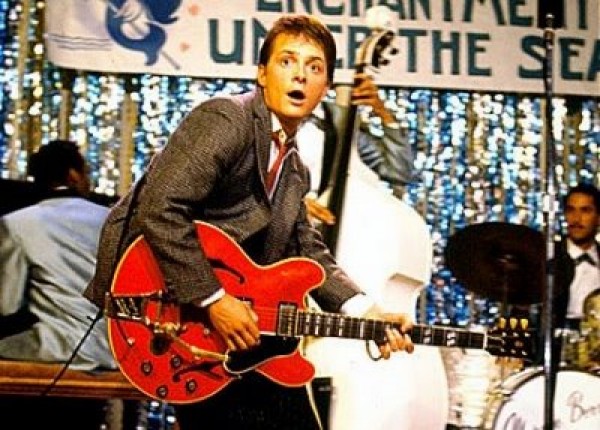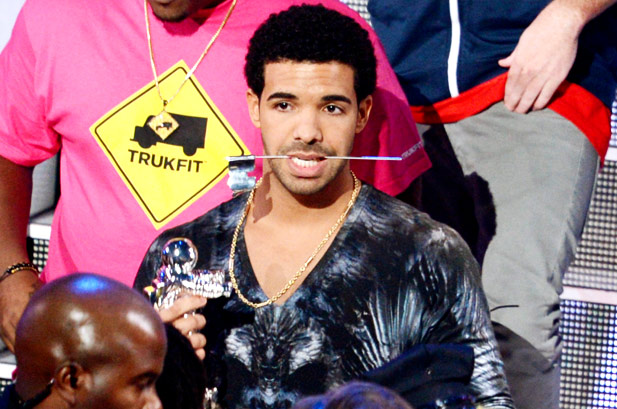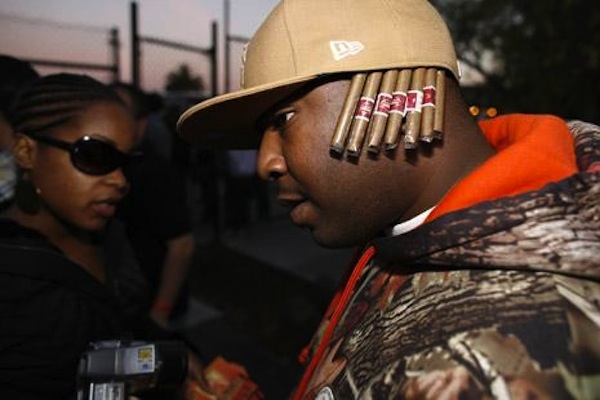One of the Internet's great accomplishments is widening the pool of writers for various topics. Before the Internet, restriction of access made it difficult to write effectively about a lot of stuff without playing nice with those you were writing about. So, for example, sports reporters tended to be ex-athletes who were just excited to be in the same room as the pros. Now we spend as much time clowning athletes for their terrible hollering skills as we do praising their performance on the field, word to Brett Favre. And that's great because athletes are fundamentally entertainment and we should treat them not like the infallible Christian God, but like entirely dysfunctional Greek gods.In the music industry, this meant freedom of coverage. What that did to (and for) the music industry is an entire other article (or book), but before the internet, rap always had an outsider status. No matter how popular a rapper was, his or her fame was always handled like some kind of exception or curiosity by the mainstream press. Meanwhile, the same mags reported it every time up and coming buzz bands scratched their collective dicks. A rap group could go platinum and still not get so much as a token write-up from Rolling Stone while Oasis's latest feud would land them on the cover.It made a lot of people uncomfortable when sprawling write-ups of Young Jeezy mixtapes and casual references to Paul Wall became a regular part of Pitchfork, especially when white ex-hardcore dudes were writing them. But it also went a long way to correct the long-standing anti-rap bias in the mainstream music press: even if Jeezy was still "underground", anyone who was paying attention knew he would be a household name within six months. It didn't really matter who was writing it (as if everyone who had ever written an article about a rapper was born with a gold-plated hood pass anyways), because for the first time, movements in rap were getting the same attention as their rock counterparts. However, it also didn't matter because the writing was fair and well-informed.I wish I could say the same for a lot of rap writing today, which is chock full of falsehoods, assumptions based on lack of context, mild racism and a general misunderstanding of the music and the culture. And I'm not out here claiming to be any kind of grand authority, I just want writers to stop thinking that they can write an informed review of the Meek Mill album because they know all the words to "House Party" and do a pretty good Rick Ross grunt. So before you pitch that article about a rapper, check yourself on these issues before you play yourself like Jeru. YOU HAVE BEEN LISTENING TO RAP FOR LESS THAN TWO YEARSThis doubles as, "Are you under the age of 23?" but that one is a little more flexible (Ed: Damn it, Skinny.). If you're going to write anything authoritative, you need to have context. There are dudes out here writing about Rick Ross that haven't heard Port Of Miami and don't understand how strange (yet appropriate) it is that Rozay used to be defined by his lack of depth, rather than his lack of relationship to anything resembling reality. There are writers talking about Big K.R.I.T. continuing Pimp C's legacy who don't remember a time when hip-hop purists shitted on UGK because they were from the South. There are articles praising Madlib and MF Doom without mentioning either Lootpack or KMD. Writers still giving rappers credit for "keeping it real" for their art, as if every successful rapper is a sell-out--this shit is professional wrestling and rappers get their histories re-written and conveniently redacted as needed. And I'm fine with that, but to write accurately about an artist one needs to see through it. We give Kanye a lot of room to do dumb shit because we watched him work his way to the top, then figure out how to act when he got there. We should know everyone's history at least half as well.(Related: You can't "look back" at an album if you weren't there looking at it in the first place. You don't get to challenge conventional wisdom about an album if you have no idea what people really thought about it when it dropped.)
YOU HAVE BEEN LISTENING TO RAP FOR LESS THAN TWO YEARSThis doubles as, "Are you under the age of 23?" but that one is a little more flexible (Ed: Damn it, Skinny.). If you're going to write anything authoritative, you need to have context. There are dudes out here writing about Rick Ross that haven't heard Port Of Miami and don't understand how strange (yet appropriate) it is that Rozay used to be defined by his lack of depth, rather than his lack of relationship to anything resembling reality. There are writers talking about Big K.R.I.T. continuing Pimp C's legacy who don't remember a time when hip-hop purists shitted on UGK because they were from the South. There are articles praising Madlib and MF Doom without mentioning either Lootpack or KMD. Writers still giving rappers credit for "keeping it real" for their art, as if every successful rapper is a sell-out--this shit is professional wrestling and rappers get their histories re-written and conveniently redacted as needed. And I'm fine with that, but to write accurately about an artist one needs to see through it. We give Kanye a lot of room to do dumb shit because we watched him work his way to the top, then figure out how to act when he got there. We should know everyone's history at least half as well.(Related: You can't "look back" at an album if you weren't there looking at it in the first place. You don't get to challenge conventional wisdom about an album if you have no idea what people really thought about it when it dropped.) YOU DON'T LISTEN TO MAINSTREAM RAPIt blows my mind how pervasive the idea that some rap is good and some rap is bad and that "mainstream" rap is inherently bad has been. In 1997 this kind of made sense. Now it's just some shit people tell themselves to soothe the insecurity they feel when everyone at a bar is having fun yelling the hook to "Love Sosa" and they don't know it. And to make things worse, people still get self-righteous like rappers are responsible for the violence around them (and, even more stupidly, that their own boycott can affect that violence). If you buy into that idea at all, please don't write about rap. If it's popular, it's important; the tastes of high school kids across America are way more important than what Rock the Bells headliners tell you is bad for society. It doesn't matter if you don't like it and if it makes you uncomfortable maybe you aren't built for this.You also need to listen to the radio. Rock fans scoff at the idea of "rock radio" and assume every genre is as out of touch with what "true fans" want. In reality, rap radio is the one of the few good things left on the commercial radio dial. Even as Clear Channel and other mass media companies buy up the stations, they still employ real DJ's mixing live in prime time and real personalities saying often questionable shit with little or no reprimand. Local artists get heavy rotation next to national stars. If you live in the New York area and you aren't occasionally tuning into Hot 97 to hear Funk Flex play the same song for twenty minutes while telling you to rob your local bodega or talk to himself about cars over an old Jay-Z instrumental, you are out of touch.
YOU DON'T LISTEN TO MAINSTREAM RAPIt blows my mind how pervasive the idea that some rap is good and some rap is bad and that "mainstream" rap is inherently bad has been. In 1997 this kind of made sense. Now it's just some shit people tell themselves to soothe the insecurity they feel when everyone at a bar is having fun yelling the hook to "Love Sosa" and they don't know it. And to make things worse, people still get self-righteous like rappers are responsible for the violence around them (and, even more stupidly, that their own boycott can affect that violence). If you buy into that idea at all, please don't write about rap. If it's popular, it's important; the tastes of high school kids across America are way more important than what Rock the Bells headliners tell you is bad for society. It doesn't matter if you don't like it and if it makes you uncomfortable maybe you aren't built for this.You also need to listen to the radio. Rock fans scoff at the idea of "rock radio" and assume every genre is as out of touch with what "true fans" want. In reality, rap radio is the one of the few good things left on the commercial radio dial. Even as Clear Channel and other mass media companies buy up the stations, they still employ real DJ's mixing live in prime time and real personalities saying often questionable shit with little or no reprimand. Local artists get heavy rotation next to national stars. If you live in the New York area and you aren't occasionally tuning into Hot 97 to hear Funk Flex play the same song for twenty minutes while telling you to rob your local bodega or talk to himself about cars over an old Jay-Z instrumental, you are out of touch. YOU DON'T LISTEN TO UNDERGROUND RAPYeah "underground" and "mainstream" rap are borderline meaningless distinctions, but my point here is rap writers need a good knowledge of local scenes and regional history. Nothing screams "hipster with an angular haircut writing out his depth" like this write-up of this (excellent) DaVinci posse cut, not just for the out-of-nowhere glorification of the Re-Up Gang, but also for calling Bay Area mainstay The Jacka a "relative unknown." Granted, Bay Area street rap is full of prolific weirdos who have been around for 20 years, but Jacka is a fixture with a deep catalog. He's arguably better known than DaVinci.At the same time--and it pains me that I even have to say this--anyone whose touchstones in the rap world are Jay-Z, Snoop and Will Smith shouldn't be saying a damn thing about rap because it's probably going to be wild racist.DAMN DUDE THAT'S A LOT TO ASK OF SOME INTERNET WRITING KID FRESH OUT OF COLLEGEWell maybe that internet writing kid shouldn't be the one that gets the assignment. And maybe homeboy (or homegirl) shouldn't be pitching shit he (or she) is not qualified to cover.Ed: As an addendum, I'd like to add that if you want to write about rap music and you're an idiot kid fresh out of college, there's still hope. We're all sort of idiots, but the things that separates actual intelligent humans from regular idiots is that smart people are down to educate themselves, so they can be idiots about other, hopefully less-important things than whatever they're submitting to the public eye. The cool thing about music is there's a shit-ton of it and you can listen to pretty much all of it whenever you want, so fuck it, you might as well listen to those mid-period Method Man albums because there's actually some pretty sweet shit on there. Need context? Well, the Internet is still a thing, and you can find lots of vintage issues of magazines like The Source and Vibe on Google Books (no it's not cool but then again most writers aren't cool so whatever), and that can give you a vague sense of what the culture and scene was like back in the day. More importantly, talk to people who are older and wiser than you and were there to see the shit that you only heard about because of Wikipedia. Their stories are usually not boring and they will enlighten you. So yeah. Make a blog, write a bunch of shitty shit there, learn a bunch of stuff, and once you know what you're talking about pretend that blog never existed and start putting yourself out there.@skinny412
YOU DON'T LISTEN TO UNDERGROUND RAPYeah "underground" and "mainstream" rap are borderline meaningless distinctions, but my point here is rap writers need a good knowledge of local scenes and regional history. Nothing screams "hipster with an angular haircut writing out his depth" like this write-up of this (excellent) DaVinci posse cut, not just for the out-of-nowhere glorification of the Re-Up Gang, but also for calling Bay Area mainstay The Jacka a "relative unknown." Granted, Bay Area street rap is full of prolific weirdos who have been around for 20 years, but Jacka is a fixture with a deep catalog. He's arguably better known than DaVinci.At the same time--and it pains me that I even have to say this--anyone whose touchstones in the rap world are Jay-Z, Snoop and Will Smith shouldn't be saying a damn thing about rap because it's probably going to be wild racist.DAMN DUDE THAT'S A LOT TO ASK OF SOME INTERNET WRITING KID FRESH OUT OF COLLEGEWell maybe that internet writing kid shouldn't be the one that gets the assignment. And maybe homeboy (or homegirl) shouldn't be pitching shit he (or she) is not qualified to cover.Ed: As an addendum, I'd like to add that if you want to write about rap music and you're an idiot kid fresh out of college, there's still hope. We're all sort of idiots, but the things that separates actual intelligent humans from regular idiots is that smart people are down to educate themselves, so they can be idiots about other, hopefully less-important things than whatever they're submitting to the public eye. The cool thing about music is there's a shit-ton of it and you can listen to pretty much all of it whenever you want, so fuck it, you might as well listen to those mid-period Method Man albums because there's actually some pretty sweet shit on there. Need context? Well, the Internet is still a thing, and you can find lots of vintage issues of magazines like The Source and Vibe on Google Books (no it's not cool but then again most writers aren't cool so whatever), and that can give you a vague sense of what the culture and scene was like back in the day. More importantly, talk to people who are older and wiser than you and were there to see the shit that you only heard about because of Wikipedia. Their stories are usually not boring and they will enlighten you. So yeah. Make a blog, write a bunch of shitty shit there, learn a bunch of stuff, and once you know what you're talking about pretend that blog never existed and start putting yourself out there.@skinny412
Advertisement
Advertisement

Advertisement

Advertisement
